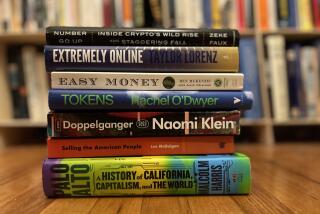Worlds Apart?
- Share via
Futurist Alvin Toffler outlined the evolution of power in his recent book, “Power Shift.” In the distant past, Toffler wrote, power derived from brute force, and in recent centuries from wealth, but now the Age of Information has arrived. Digby Diehl, moderator of a recent symposium, “Books to Bytes: Tension in the Transition,” sponsored by Occidental College and Vroman’s Bookstore, spoke of Toffler’s concept in his opening remarks. An audience of 250 attended the event. Panelists Ward Ritchie, scholar and publisher, and John Espey, UCLA professor and author, are both legendary in Southern California’s relatively short literary history. Dressed in conservative coats and ties, these two distinguished octogenarians represented “Books” while Paul Saffo, 39, a director of the Institute for the Future in Menlo Park represented “Bytes.” On a low table in front of the dais, a six-volume, leather-bound set of Gibbon’s “The Roman Empire” rested between marble bookends next to a computer keyboard and screen. The setting itself seemed to pose the question, “What form will books take after the Transition?”
While Espey and Ritchie are revered figures, Saffo inspired something closer to a nervous awe as a cybernetic seer, a “techno-guru.” Most of the questions from the audience were for him. Ritchie, 89, was raised in South Pasadena and founded Ward Ritchie Press in 1936, specializing in publishing books on the American West, from histories to cookbooks. Ritchie said he believes books will be the prime repositories of ideas and expression in the future. Espey, 81, shared many of the reservations others voiced about the printed page being entirely replaced by new media, he did suggest that listening to books on tape in L.A. traffic jams allow many to actually reach the end of great (lengthy) Russian novels.
The average age of the audience was close to, if no over 50. Virtually every person to rise with a question identified themselves as a librarian and, with the exception of Cal Tech’s librarian, they seemed a bit dubious about the unmixed blessing of he information superhighway. The concerns raised by those asking questions or making comments reflected practical concerns, a few aesthetic issues and, frankly, more than a little “technophobia” (the phrase “soulless technology” was used).
At one point Saffo, the panel’s “tekkie” described a state-of-the-art document titled “Agrippa.” It is a short story by sci-fi author William Gibson. Saffo said the deluxe edition is $14,000 but went on to explain that both available formats, paper and computer disc are very temporary. The paper edition is printed with ink containing chemicals causing the text to slowly vanish after exposure to light. The disc has a built-in computer virus that “eats” the text as the screen, on automatic scroll, allows only one chance to read and no chance to print it out. Ward Ritchie, who has spent his career in publishing creating carefully crafted books, cringed visibly when he heard this. Diehl, musing on the possibility of a book-less world, asked Saffo if the libraries and bookstores of the future would be “nothing more than electronic filling stations?” Saffo, too witty to play the villain, underscored the fact that technology can have a human face. At one point he observed, “talking about the future of books to this group is like talking about the future of religion in front of the pope.”
More to Read
Sign up for our Book Club newsletter
Get the latest news, events and more from the Los Angeles Times Book Club, and help us get L.A. reading and talking.
You may occasionally receive promotional content from the Los Angeles Times.










